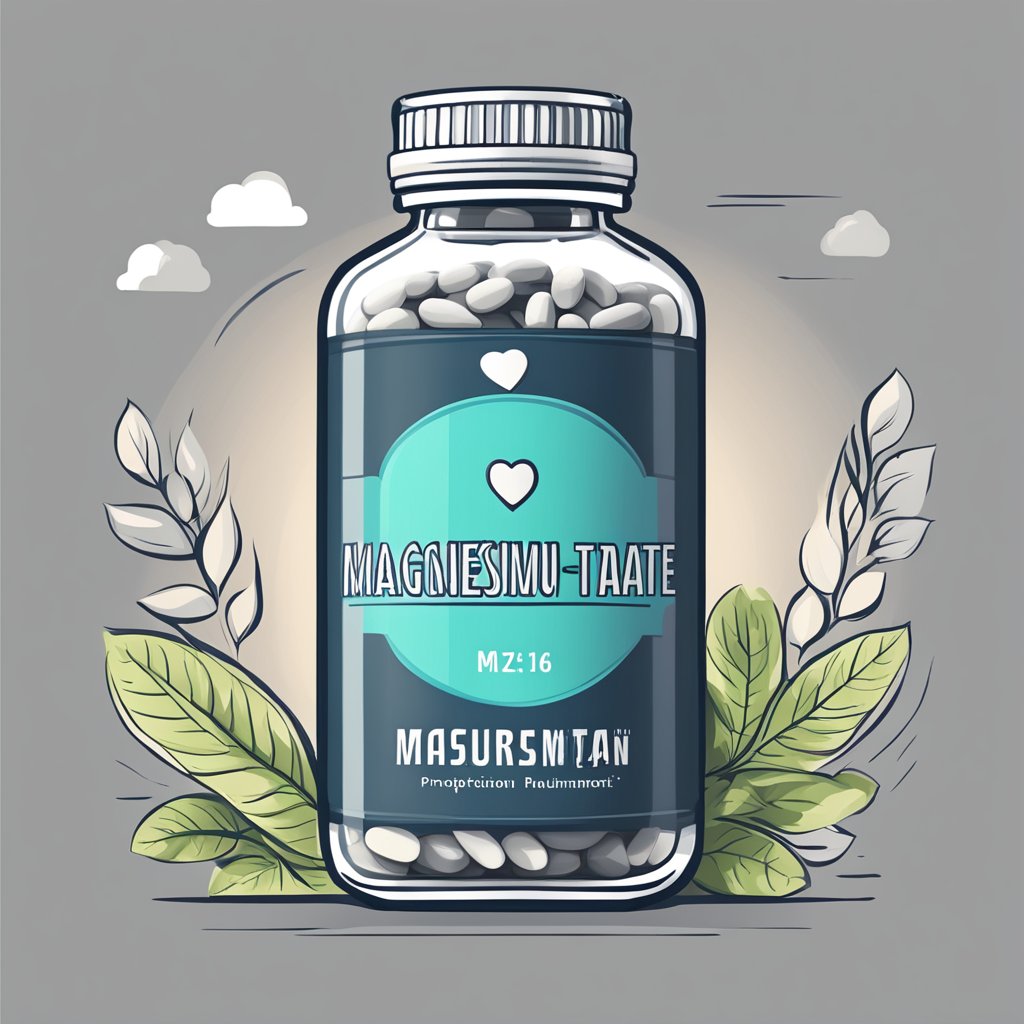Magnesium plays a crucial role in maintaining heart health, and its importance can be particularly noted in the context of heart palpitations. These uncomfortable and sometimes alarming sensations of a racing or irregular heartbeat can often be attributed to various factors, one of which may be a deficiency in magnesium—a mineral vital for numerous bodily functions, including the regulation of heart rhythm. While magnesium is available through dietary sources like leafy greens, nuts, and seeds, some individuals may need to supplement to achieve adequate levels, particularly if they experience heart palpitations.

Choosing the right magnesium supplement for heart palpitations is essential, as not all forms of magnesium are absorbed equally by the body. Specific forms of magnesium, such as magnesium glycinate or magnesium taurate, have been suggested to be more beneficial for heart health due to their better absorption rates and added heart-friendly benefits. It is important for individuals to consult with a healthcare provider to determine the cause of their palpitations and to discuss the possibility of magnesium supplementation, as well as the most appropriate and effective form for their particular needs.
Key Takeaways
- Magnesium is essential for heart rhythm regulation and can impact heart palpitations.
- Dietary magnesium may be sufficient for some, while others may require supplements.
- Consultation with a healthcare provider is key when choosing a magnesium supplement for heart palpitations.
Understanding Magnesium and Its Role in the Body
As we explore magnesium’s significance, I’ll focus on its influence on heart health and how various forms of magnesium supplements differ in bioavailability.

Types of Magnesium and Bioavailability
Concerning my body’s absorption of magnesium, the bioavailability of different magnesium types is critical. For instance:
- Magnesium citrate: Known for good absorption rates.
- Magnesium taurate: Often recommended for heart health due to its absorption efficiency.
- Magnesium oxide: Less bioavailable, which might affect its effectiveness.
Since bioavailability can dictate the magnesium’s effect in my body, selecting the right type is essential for addressing specific health issues, such as regulating my heartbeat.
Magnesium’s Effect on Heart Health and Palpitations
Magnesium is a crucial mineral that serves as an electrolyte in my body. It helps to regulate my blood pressure and is vital for energy production, muscle contraction, and maintaining a normal heart rhythm. When my magnesium levels are low — a state known as magnesium deficiency — it can negatively impact my heart health, potentially leading to heart disease and palpitations.
For palpitations, specifically:
- Magnesium’s Role: It helps stabilize the electrical impulses in my heart’s atria, promoting a steady heartbeat.
- Dosage: It’s important to note that the right magnesium dosage can vary and should be tailored to my individual needs.
In managing heart palpitations, I consider supplements like magnesium taurate for their potential to benefit cardiovascular health owing to their higher bioavailability. It’s also crucial for me to monitor my blood sugar and oxygen levels, as magnesium plays a role in these areas that can indirectly affect heart rhythm.
Magnesium Rich Foods and Dietary Sources
I find it essential to know that incorporating magnesium-rich foods into your diet is a natural way to potentially alleviate heart palpitations. Foods such as spinach, various nuts, legumes, seeds, and green leafy vegetables are excellent dietary sources of magnesium.
Incorporating Magnesium-Rich Foods into Your Diet
I recommend consuming a variety of magnesium-rich foods daily to maintain optimal magnesium levels. Here’s a list of magnesium-heavy hitters that you could easily add to your meals:
- Spinach: One cup of cooked spinach contains 157 mg of magnesium.
- Nuts: Almonds, cashews, and Brazil nuts are among the top choices, with almonds providing 80 mg per ounce.
- Legumes: A cup of cooked black beans offers 120 mg of magnesium.
- Seeds: Incorporating chia seeds or flaxseeds into your diet can provide a good magnesium boost.
- Whole Grains: Oatmeal is a comforting source, with nearly 58 mg of magnesium per cup.
- Fruits: Bananas are not just about potassium; they also offer around 37 mg of magnesium per large fruit.
To make these foods a regular part of your diet, I suggest adding spinach to your smoothies or salads, sprinkling nuts and seeds on your yogurt or oatmeal, and choosing legumes like black beans as a protein source in meals.
Magnesium Supplements vs. Dietary Intake
I believe that while supplements can be convenient, obtaining magnesium from natural food sources offers additional nutritional benefits. Here’s a clear comparison:
- Dietary Magnesium: Includes fiber and other minerals, and has a lower risk of magnesium overdose.
- Supplements: Useful for specific deficiencies but should be taken under medical advice to avoid possible interactions with medications.
For example, one ounce of almonds not only gives you magnesium but also vitamin E and healthy fats, while a supplement may only provide magnesium. I always choose foods first but consider supplements if I’m not meeting my magnesium needs through diet alone.
Signs of Magnesium Deficiency and Health Implications
Magnesium deficiency can lead to an array of symptoms and impacts cardiovascular health significantly. My focus here is to unpack these symptoms and outline the risks specifically associated with heart health.
Identifying Low Magnesium Levels and Associated Symptoms
Recognizing low magnesium levels is crucial to addressing potential health issues. Typical symptoms indicative of a magnesium deficiency include:
- Weakness: A general feeling of physical exhaustion that is not alleviated by rest.
- Muscle Weakness: This goes beyond general fatigue and refers to a decrease in muscle strength.
- Fatigue: Persistent tiredness that affects daily activities.
- Arrhythmias: Irregularities in heart rhythm that can feel like heart palpitations.
- Depression: Low mood or persistent sadness that may be accompanied by a lack of interest or pleasure in life.
If I experience any combination of these symptoms, I should consider consulting a healthcare provider to test my magnesium levels.
Consequences of Magnesium Deficiency on Heart Health
A deficiency in magnesium can have significant effects on heart health. Some of the primary consequences include:
- High Blood Pressure: Magnesium plays a role in regulating vascular resistance and in the maintenance of endothelial function, contributing to normal blood pressure levels.
- Atrial Fibrillation: Low magnesium can disrupt electrical signaling in the heart, potentially leading to atrial fibrillation, a condition characterized by an irregular and often rapid heart rate.
- Heart Palpitations: With reduced magnesium, palpitations or fluttering sensations in the chest are common due to its role in maintaining a stable heart rhythm.
Patients with conditions such as diabetes may be particularly vulnerable to the cardiovascular effects of magnesium deficiency due to the increased risk of arrhythmic events in this population. Keeping an eye on magnesium levels is an integral part of managing heart health, especially for those with a predisposition to cardiac concerns.
Choosing the Right Magnesium Supplement
When you’re experiencing heart palpitations, selecting an appropriate magnesium supplement is pivotal for your cardiovascular health.
Evaluating Different Forms of Magnesium Supplements
I understand that the various forms of magnesium supplements have different absorption rates and effects on the body. Magnesium citrate is commonly recommended due to its good bioavailability and balance between efficacy and affordability. Magnesium orotate is particularly favoured for cardiac concerns as it is thought to support heart health, although it’s often more expensive. On the other hand, magnesium sulfate is typically used in hospitals for acute cases and is not suitable for regular oral supplementation due to its laxative effect. Lastly, magnesium malate is praised for its ability to support muscle relaxation and may be beneficial for heart palpitations, but it’s essential to confirm its suitability with a healthcare provider.
- Magnesium Citrate: Good bioavailability, cost-effective.
- Magnesium Orotate: Supportive for heart health, higher cost.
- Magnesium Sulfate: Not for oral use, used in acute hospital settings.
- Magnesium Malate: Supports relaxation, consult with healthcare provider.
Recommended Dosage and Potential Side Effects
The recommended magnesium dosage typically ranges from 200 to 400 mg per day. It’s crucial to start with a lower dose to gauge my body’s response and gradually increase if needed, always under the guidance of a healthcare provider. Taking a dose higher than the body needs may lead to magnesium toxicity, which presents symptoms like nausea or an irregular heartbeat, and in extreme cases, it can contribute to heart failure. Thus, I must never self-prescribe the dosage and should always consult a cardiologist or a healthcare provider.
- Dosage Range: 200-400 mg/day, start low, increase gradually.
- Consultation: Seek guidance from a healthcare provider.
- Side Effects: Nausea, irregular heartbeat, magnesium toxicity possible if overdosed.
NOTE: Regular follow-ups and monitoring with a healthcare provider are necessary to adjust the dosage and prevent any adverse effects. The right magnesium supplement and its correct dosage can significantly contribute to the treatment and relaxation of the heart, mitigating palpitations safely.
Frequently Asked Questions
In managing heart palpitations with magnesium, it’s important to choose a form that is well-absorbed and suited to your specific symptoms. Below, I address commonly asked questions about magnesium types and their effects on heart health.
How long does it typically take for magnesium supplements to alleviate heart palpitations?
Magnesium supplements may take a few days to a few weeks to alleviate heart palpitations. The response time can vary depending on individual absorption rates and the severity of magnesium deficiency.
Which magnesium compound is more effective for anxiety accompanied by heart palpitations, taurate or glycinate?
Magnesium taurate is often recommended for anxiety with heart palpitations because it combines magnesium with taurine, which has a calming effect. Magnesium glycinate is also effective due to its good absorption rate and less laxative effect than other forms.
What are the benefits of magnesium taurate for individuals dealing with atrial fibrillation?
Magnesium taurate can be beneficial for atrial fibrillation as it supports both heart function and nerve impulses. It helps maintain proper electrical activity and calms the nervous system, potentially reducing the frequency of arrhythmias.
Can magnesium glycinate help with heart palpitations, and if so, how does it compare with other forms?
Magnesium glycinate is known for its ability to assist in managing heart palpitations, especially for individuals who are dealing with concomitant stress or sleep issues. It is gentler on the stomach compared to magnesium oxide or citrate.
How much magnesium is generally recommended for managing arrhythmias or irregular heartbeats?
The recommended dose of magnesium varies, but for arrhythmias, a common starting point is 200-400 mg of elemental magnesium daily. However, dosing should be personalized based on individual needs and under medical supervision.
Among the various magnesium compounds, which is considered optimal for overall heart health?
For overall heart health, magnesium taurate and magnesium bisglycinate are considered optimal due to their cardiovascular benefits and bioavailability. Choosing between them depends on specific health considerations and should be discussed with a healthcare provider.